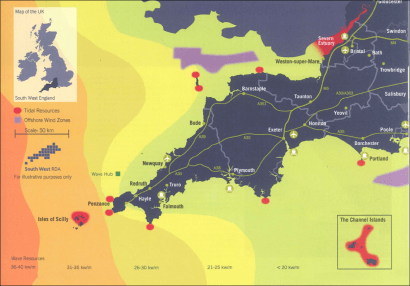
The South West Marine Energy Park will stretch from Bristol through to Cornwall and as far as the Isles of Scilly. It will create a collaborative partnership in the region between national and local government, Local Enterprise Partnerships, the Universities of Plymouth and Exeter and industry including Cornwall’s famous Wave Hub. The aim of the partnership will be to speed up the progress of marine power development.
According to the Department for Energy and Climate Change (DECC), energy from the waves or tides has the potential to generate up to 27 GW of power in the UK alone by 2050, equivalent to the power generated from 8 coal-fired power stations, as well as helping to reduce emissions to fight climate change.
“This is a real milestone for the marine industry and for the South West region in securing its place in renewables history as the first official marine energy park. The South West can build on its existing unique mix of renewable energy resource and home-grown academic, technical and industrial expertise,” said Greg Barker. “Marine power has huge potential in the UK not just in contributing to a greener electricity supply and cutting emissions, but in supporting thousands of jobs in a sector worth a possible £15bn to the economy to 2050.
“The UK is already a world leader in wave and tidal power, so we should capitalise on this leadership to make marine power a real contender in the future energy market,” Barker continued.
During his visit, the Minister launched the South West Marine Energy Park Prospectus which outlines how the region’s public and private sector will work together with the government and other key national bodies such as the Crown Estate. The work to develop the South West Marine Energy Park has been commissioned by Cornwall Council and Plymouth City Council. The work was undertaken by Regen SW.
The Cabinet member for economy at Cornwall Council, Chris Ridgers, welcomed the news, saying: “Cornwall’s marine energy programme is reinforced by more than a thousand years of industrial heritage. The land and the sea have provided the foundation of Cornish entrepreneurship in engineering and innovation, recognised across the world. Now, in the 21st century, Cornwall continues to provide the perfect balance between resource, people and infrastructure supporting the South West Marine Energy Park and unlocking the potential of a global industry. ”
The Leader of Plymouth City Council, Councillor Vivien Pengelly, echoed Ridgers sentiment saying that the opportunity for growth and increased commercialisation in marine renewable energy “represents a major opportunity to help Plymouth’s economy generate investment and jobs”. She added that Plymouth has world-class research and development expertise in this field along with a strong marine business base and advanced manufacturing sector and looks forward to working closely with its private and public sector partners to make the South West Marine Energy Park a success.
Marine renewables in spotlight next month
Marine renewable energy will be firmly in the spotlight at Oceanology International 2012 (13-15 March 2012, London, ExCeL, UK) the global forum where industry, academia and government share knowledge and connect with the marine technology and ocean science community, improving their strategies for measuring, exploiting, protecting and operating in the world’s oceans.
On the opening day of the show, a full conference day will be devoted to marine renewables focusing on the latest technologies and services supporting their development, and the three-day exhibition features a dedicated Renewable Energy Pavilion hosted by RenewableUK. Both the exhibition and conference are free to attend.
“With the 32-GW Round 3 announcement in 2010 and recent announcements from major companies aiming to site turbine manufacturing facilities in the UK, offshore wind has moved very much into the mainstream,” says Event Manager, James Coleman of Reed Exhibitions. “At the same time, the UK continues to lead the world in the developing wave and tidal sector as we move from demonstration devices to the first full scale arrays. Oceanology International’s audience has an important role to play in these developments and in similar activities around the globe.”
Following an introduction by Alan Moore (Chairman of the Marine Renewables conference stream at Oceanology International 2012, Non-Executive Director of Partnerships for Renewables Ltd, Chairman of Ventus2 VCTplc; and a Visiting Fellow of Imperial College), Nick Medic of RenewableUK will give an overview of offshore renewables. This will be followed by a developer’s perspective; and a detailed look at installation. Subsea diving/engineering will be covered by Ed Woodrow of Red Services, with Rob Grimmond of OMM talking about cables.
In the afternoon Sandra Lengden of Aquamarine Power will be looking at metocean requirements for near-shore wave farms; with Duncan Talbert of MMI Engineering covering offshore wind turbine foundation scour. Mick Cook of MCL will then give his audience an update on the preparation of a geophysical/geotechnical guideline to aid mitigation of commercial and safety risks in offshore renewable energy developments; and his presentation will be followed by the one that so fascinates Alan Moore – ocean fronts as an indicator of marine animals: expediting site selection and survey for offshore renewables being presented by Dr Peter Miller of PML.
The day will finish with the Renewables Training Network led by Steve Green of RenewableUK.
[Inset: Wave resource in South West England Image courtesy of RegenSW]
For additional information:

